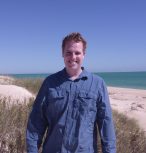DNA reveals the past and future of coral reefs
New DNA techniques are being used to understand how coral reacted to the end of the last ice age in order to better predict how they will cope with current changes to the climate. James Cook Univer

From 2005 to 2022, the main node of the ARC Centre of Excellence for Coral Reef Studies was headquartered at James Cook University in Townsville, Queensland (Australia)








Abstract:
The thermal conditions in which coral reefs live are governed by ocean and atmospheric processes that occur over a vast range of scales, ranging from large-scale processes at the scale of ocean basins (order thousands to tens of thousands of km), to regional scale ocean dynamics (order 100 km), to smaller-scale (order km or less) processes occurring at the scale of individual reefs. In this talk I will discuss the role that tides in particular play in regulating temperature variability and thermal extremes within reef environments, focusing on recent research activities in northwestern Australia as a case study of these dynamics.
At the scale of individual reefs, I will discuss how temperature variability within tide-dominated reef habitats (such as those found throughout northern Australia) often differ substantially from the surrounding ocean and how thermal extremes can be accurately predicted (now and in the future) by assessing the mechanisms that control reef heat budgets. Using data from field studies in Kimberley region of northwestern Australia, I will show how a simple heat budget model can be used to investigate how tidal and solar heating cycles interact with reef morphologies to control diurnal temperature extremes within shallow tidally-forced reefs. This model is then extended to show how reefs globally with tidal amplitudes comparable to their depth relative to mean sea level tend to experience the largest temperature extremes. As a consequence, this analysis reveals how even a modest sea level rise can substantially reduce temperature extremes within tide-dominated habitats, more generally.
Finally, on larger (regional scales) I will discuss our current research into the ocean drivers of coral bleaching across northwestern Australia during 2016, and the notable role that tidal mixing in particular played in controlling temperature variability and thermal stress across the region.
Bio: Ryan is an Australian Research Council Future Fellow, a Professor at the University of Western Australia, and a Chief Investigator of the ARC Centre of Excellence for Coral Reef Studies. He has a unique background in coastal oceanography and environmental engineering that enables him to tackle complex (and often multidisciplinary) research problems in coral reef systems. Major areas of research focus include: understanding how ocean dynamics drive physical and other environmental variability within coral reefs; how these dynamics influence a range of complex biophysical processes, and finally how these processes can be numerically predicted and accurately forecast into the future.
New DNA techniques are being used to understand how coral reacted to the end of the last ice age in order to better predict how they will cope with current changes to the climate. James Cook Univer
A new study on the effects of climate change in five tropical countries has found fisheries are in more trouble than agriculture, and poor people are in the most danger. Distinguished Profess
James Cook University researchers have found brightly coloured fish are becoming increasingly rare as coral declines, with the phenomenon likely to get worse in the future. Christopher Hemingson, a
Researchers working with stakeholders in the Great Barrier Reef region have come up with ideas on how groups responsible for looking after the reef can operate more effectively when the next bleaching
Abstract: As marine species adapt to climate change, their heat tolerance will likely be under strong selection. Individual variation in heat tolerance and its heritability underpin the potential fo
Abstract: The Reef Ecology Lab in KAUST’s Red Sea Research Center explores many aspects of movement ecology of marine organisms, ranging from adult migrations to intergenerational larval dispersal
Abstract: Macroalgal meadows are a prominent, yet often maligned component of the tropical seascape. Our work at Ningaloo reef in WA demonstrate that canopy forming macroalgae provide habitat for ad
Abstract: Sharks are generally perceived as strong and fearsome animals. With fossils dating back at least 420 million years, sharks are not only majestic top predators but they also outlived dinosa
Abstract: Connectivity plays a vital role in many ecosystems through its effects on fundamental ecological and evolutionary processes. Its consequences for populations and metapopulations have been
Abstract: Evolution of many eukaryotic organisms is affected by interactions with microbes. Microbial symbioses can ultimately reflect host’s diet, habitat range, and even body shape. However, how
Abstract: The past few years have seen unprecedented coral bleaching and mortality on the Great Barrier Reef (GBR) but the consequences of this on biodiversity are not yet known. This talk will expl